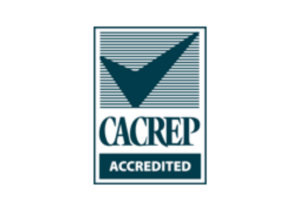La Salle University

RSVP for a Virtual Info Session
Tuesday, June 10 at 1 p.m.
Join us for an opportunity to hear from the graduate program director, ask questions, and learn about our unique clinical and research opportunities.
What You’ll learn
La Salle’s Professional Clinical Counseling (PCC) program prepares students for licensure as professional counselors (LPC) in Pennsylvania and most other states and for employment in many professional settings including mental health agencies and hospitals, college counseling and career centers, employee assistance programs, and for private practice. Prior to graduating from this program, students are eligible to take the national exam (NCE) for licensure. The PCC degree also is excellent preparation for students planning to pursue doctoral studies in counselor education and supervision or a related field.
Accreditation
La Salle’s Professional Clinical Counseling Program is accredited by the Council for Accreditation of Counseling and Related Educational Programs (CACREP). CACREP accredits degree programs in counseling and its specialties offered by colleges and universities worldwide.

Student Outcomes
- 100% field-related employment / doctoral program admission rate within 180 days of graduation
- Immediately after graduation, students often are employed at group private practices, schools, and community mental health agencies; after getting fully licensed, many form their own private practice.
CACREP VITAL STATISTICS
Each year, the Master’s Program in Professional Clinical Counseling submits a Vital Statistics Report to its accrediting body, The Council for Accreditation of Counseling and Related Educational Programs (CACREP). This report is a requirement of all CACREP-accredited programs, and must be publicly reported on the program website annually.
ANNUAL REPORT
The following report is written in accordance with the 2024 CACREP Standard E and Standard F.
Why Study Professional Clinical Counseling at La Salle?
La Salle University believes in a personal, practical, and professional graduate education, and occurs in the context of the Lasallian tradition focusing on excellence in teaching and concern for both ultimate values and for the individual values of its students. La Salle’s Counseling and Family Therapy Master’s Programs have been training counselors and therapists since 1979. Its resources are extensive, and include the following:
- Affiliations with over 60 regionally-recognized field placement sites in the greater Philadelphia area, which is especially rich in its mental health resources.
- A dedicated Field Placement Coordinator for the PCC Program who assists students in applying to and securing Practicum and Internship placements.
- An annual program meeting that informs students about the LPC license and a Graduate Advisor who assists students in obtaining licensure.
- Approval by the National Board of Certified Counselors (NBCC) to offer the National Counselors Exam (NCE), the exam accepted by Pennsylvania and many other states for licensure as a Professional Counselor, allowing students to take the NCE prior to graduation and earn the National Certified Counselor (NCC) credential.
Our program offers a unique and comprehensive educational experience designed to a focus on flexibility, interdisciplinary learning, and practical skills development by offering:
- Strong training in counselor identity while giving a multidisciplinary experience, where learning takes place with students and from professors from marriage and family therapy, social work, and psychology programs.
- Broad-based clinical training, including coursework in trauma and addictions.
- The ability to take an elective related to couples and family therapy.
- Late afternoon and evening classes convenient for the working professional
The thoroughness of La Salle’s training is widely recognized in the Philadelphia area and sets its graduates apart.
Highlighted Courses
PCC 502 – Counseling Laboratory I
This laboratory course is designed to develop the basic counseling and therapy skills that enables students to understand the client/s, develop a trusting relationship with the client/s, and to facilitate the client/s’ self-exploration.
PCC 601 Grief, Loss and Trauma Counseling
This course will provide students with an advanced understanding of grief, loss, trauma, and related counseling interventions for children, adults, and families. The basics of grief and bereavement will be explicated, as will specific disorders related to trauma. This course is designed to help students identify needs, resources and assets available to clients coping with grief and/or trauma related disorders, and research supported methods in improving client functioning.
PCMF 619 Multicultural Counseling and Therapy
This course explores multicultural counseling theory as well as culture-specific counseling strategies for culturally diverse clients. It is designed to help students develop their multicultural counseling competence and increase their ability to work effectively and ethically in a complex and diverse social world.
Meet the Faculty
Our faculty possess a wide range of disciplinary expertise dedicated to teaching, scholarship, and service, bringing their clinical and research experience into the classroom. Through one-on-one advisement, we’ll develop an individualized plan of study that meets your interests and career goals.
Application Process
The Professional Clinical Counseling Program has some additional requirements beyond the typical application process. Find more information through the link below.
What is the field of professional counseling?
Although the specific title differs from state to state, professional counselors are master’s-level clinicians who provide mental health, psychological, and/or human development principles to address wellness, personal growth, career development, and mental or emotional health issues. Education and training are oriented toward the adoption of a strengths-based, client-centered, rather than an illness-centered, approach. Professional counselors work with individuals or groups in the assessment and treatment of psychological disorders. Other activities of counselors include consultation, prevention, and research. They make up a large percentage of the workforce employed in mental health agencies and organizations, and their work is covered by managed care organizations and health plans. Many professional counselors have a private practice.